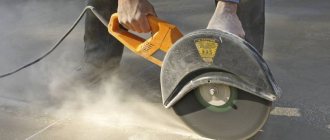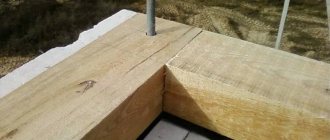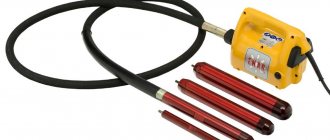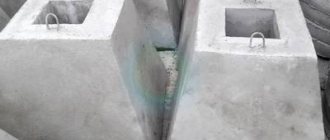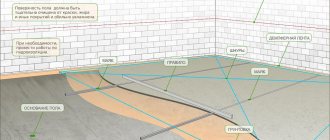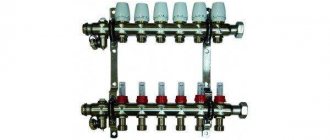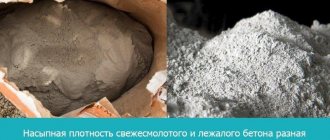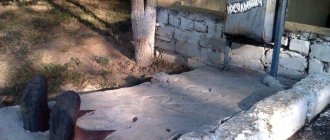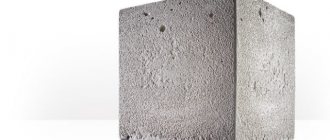Home Blog
The concrete mixing plant (BSU) is designed for the production of concrete mortar on an industrial scale, taking into account all technological features. Concrete mixing plants are widely used in the following areas:
- Construction of roads, airfields, bridges, railways, dams and dams.
- Production of ready-mixed concrete, slabs, blocks, floors, curbs, rings and other reinforced concrete products.
This type of concrete mixing equipment provides users with a large number of advantages:
- Wide possibilities for automation of the technological process.
- Economical consumption of materials.
- Accurate maintenance of specified process parameters.
- High work productivity.
- Short deadlines for installation and commissioning.
A concrete mixing plant significantly reduces the labor intensity of such a complex technological process as preparing concrete in industrial quantities.
Concrete unit or RBU (BSU) - what is it?
For decades, concrete has remained the main building material. The efficiency of developers directly depends on the quality of concrete mixtures. Moreover, the delivery of concrete to a construction site must be carried out uninterruptedly. To ensure construction with the required volume of high-quality concrete and on time, developers prefer not to use the services of concrete plants, but to build their own concrete units. A concrete unit is a complex consisting of cement warehouses, inert materials warehouses and concrete mixing plants. Concrete units significantly increase the efficiency and profitability of construction. Manufacturers of concrete units are Russian and foreign companies, for example, German, Italian, French, Chinese, etc. Concrete units are produced in different configurations: standard and special-order concrete units.
The main condition for the operation of a concrete unit is the complete mechanization of processes, i.e., the equipment of the concrete unit must carry out mechanized loading and storage of cement and inert materials (aggregates), then mechanized supply of materials to concrete mixing plants.
Concrete units can be divided into two groups - stationary and mobile concrete units. The stationary concrete unit is intended for long-term use on one construction site. And mobile concrete units are ideal for construction that involves frequent movements in space. A mobile concrete unit compares favorably with a stationary concrete unit due to its small dimensions, speed and ease of assembly and subsequent dismantling, and the ability to move using an ordinary truck. Also, unlike a stationary concrete unit, to install a mobile concrete unit, the developer will not need to draw up approval documentation.
Concrete units are produced with different capacities, ranging from 25 cubic meters of concrete per hour and ending with concrete units with a capacity of 400 m3 of concrete/hour. On small construction sites, you can use mini concrete units with a productivity of 10 m of concrete/hour.
Concrete mixing plants of concrete units include the following equipment: concrete mixers, inert materials supply devices (conveyors, augers), inert materials dosing equipment, crushed stone and sand storage tanks and an automatic control system. By the way, concrete units can be divided according to the type of storage of materials: horizontal (warehouses are located horizontally) and vertical (warehouses are vertical). Vertical storage of inert materials significantly reduces the working area occupied by the cement unit.
Concrete units come in summer, winter and all-season versions. The summer version of the concrete unit is intended for use at positive temperatures, the winter version of the concrete unit is intended for use in regions with harsh climates and is able to withstand exposure to low temperatures. In the winter version of the concrete unit, it is assumed that additional equipment will be installed, namely, the casing of the concrete mixing plant will be covered with special panels and heating will be supplied to warehouses for storing inert materials and concrete using a centralized heating system or the installation of steam generators.
For reference, only stationary units (all-season) are used, with a productivity of 60 to 120 m3 of concrete/hour.
You can buy concrete directly from a concrete plant at the factory price by calling or submitting an online application from our website.
prom-beton.ru
Descriptions and advantages of concrete mixing plants
concrete mixing plant is a product that is a priori designed for operation under heavy loads. Such a system is ready to cope with significant volumes of work, serving both one large production enterprise and several construction sites.
Concrete mixing equipment is mostly characterized by:
- high work productivity;
- reliability of all structural elements;
- economical consumption of raw materials (thanks to the strict dosing option);
- the ability to automate the process and put it on stream;
- durability of operation, good margin of safety.
In addition, consumers note moderate prices for this product with its excellent payback: a good concrete mixing plant, the price of which corresponds to its quality, will very quickly pay for itself under active operation conditions.
BSU operator's manual - step-by-step guide | Concrete and construction technologies
admin 11/17/2012
Dear Colleagues!
My many years of experience suggest that a very important document for BSU and RBU operators is a detailed and correctly written instruction, it is called “BSU Operator’s Instructions” for concrete production, it should be literally step-by-step.
The fact is that in most concrete plants, especially mobile ones, the BSU operator is, I would say, a “key figure” on whom much depends in the production of ready-mixed concrete.
My deep conviction is that production personnel should have at least a general understanding of concrete, you can find out about this on the page “Useful about concrete” where there is very popular literature on this topic, it would also not hurt to have at least a general understanding of the application ready-mixed concrete in construction.
I offer you the instructions I wrote, it is called the operator’s instructions for the Turkish BSU with a capacity of 100 cubic meters per hour (the active link is below).
In addition, the operator must know such indicators as: the moisture content of crushed stone and sand, what the true density of aggregates is, and how this will affect the strength of concrete.
The operator must be in constant contact with the on-site laboratory.
You can take it as a basis and change it taking into account the application to your RBU (power supply, program interface and other points).
This instruction manual for the operator should be written in great detail so that even a beginner BSU operator can be guided by it in his practical work.
It can be used for personnel training and also as pre-work instructions. You can download the full text of this instruction here. Instructions for the BSU operator.
I would also recommend that you get acquainted with and study my program for selecting concrete compositions; it will greatly help you in practical activities.
There is a lot of interesting information on my website besides concrete, so I recommend that you look at other materials about some unique, in their own way, technologies for the production of building materials:
1 Soil blocks, unique technology and equipment for their production.
2 Expanded vermiculite and perlite - today, these are new opportunities for production and business.
3 Sulfur concrete and sulfur asphalt are unique technologies and equipment for their production.
4 Cellular concrete - which is better? We choose the best option. The best and inexpensive option for technology and equipment for the production of building blocks from non-autoclaved aerated concrete
5 Polystyrene concrete non-combustible blocks for construction using the method without formwork construction.
6 Dry building mixtures are a simple and inexpensive method of preparation.
7 Produce and use composite reinforcement for concrete - it's profitable!
Well, let me finish here, click on this link and look at other interesting materials on my site.
I wish you success!
Best regards, Nikolai Pastukhov.
I recommend reading similar posts!
www.helpbeton.ru
Mobile concrete mixing plants – Fixed assets
S. Timofeev
Mobile concrete mixing plants (MCPs) produced by Armcon made it possible to find and fill an extremely popular, but unexplored niche in the construction equipment market, which is very unusual for this area.
The uniqueness of the BSU of this brand lies in the combination of the functions of a concrete plant and a transport mixer, and it has a number of advantages compared to analogues.
Mobility. Unlike a prefabricated plant, the structural elements of which must first be disassembled, loaded onto a transport platform, delivered to the construction site and then reassembled, the Cementech series machine arrives on site and immediately begins work. This allows the use of BSU at remote sites. For example, the mobile batching plant of the Cementech MCD8MX-150 series is capable of operating without the help of an additional dosing station, which makes it ideal for operation in remote areas, which are usually chosen for the construction of wind power plants. “We used to use traditional drum mixers,” says the founder and director of the construction company, “and I can’t imagine how we could cope without these machines with some of the new tasks assigned to us. Project on the island Gigha, for example, involved the combined use of rotary mixers and a concrete plant, which must first be filled and then transported to the crossing point. It is very difficult to securely fasten such a structure and transport it across the water. And if there were also bad weather conditions, then we could have lost the entire cargo.” Instead, only materials were transported to the island, and the Cementech machines themselves were loaded directly on the construction site, remaining in the required positions until the work was completed. They did not have to return to the “mainland” to reload (and each such crossing from place to place took 20 minutes, not taking into account the time of loading onto the ferry, securing vehicles, etc.). Without such mobile control systems from Cementech, this project would not be viable.
Minimum preparation time before starting work. Unlike moving factories, which require the preparation of a special site for the installation of structural elements, as well as debugging of equipment (all together this takes from 2 to 15 work shifts depending on the complexity of the work), the Cementech series machine does not require this, since all the equipment is pre-configured The BSU is compactly installed on a truck chassis. Therefore, there is no need to prepare a special site for placement! Having a hydraulic drive of the equipment from the vehicle's power take-off box or from an additionally installed engine, the mobile control unit does not depend on the presence of a centralized power supply source.
Versatility. A Cementech series machine fully loaded with dry ingredients is capable of delivering to work sites and mixing from 1 to 10 m3 of concrete, depending on the customer’s needs, i.e., it functions as a transport mixer. The error in mixing the required volume is ±1%. If there is a filler warehouse and a water supply at the work site, the mobile batching plant operates in the mode of a concrete plant with an average productivity of 55...60 m3/h.
The presence of an extendable unloading chute with a radius of more than 7 m allows you to unload the concrete mixture even into hard-to-reach places, and when using the unique Pumpmaster auger, the prepared mixture can be fed to a height at an angle of 45° without draining the mixture, which solves the problem of sharing a mobile batching plant with concrete pumps. The efficiency of the Pumpmaster auger, according to Richard Calder, technical director at Armcon, is due to the special grouping of its blades. “While the helix lift remains the same as other standard machines,” explains Calder, “the auger blades are grouped more closely at the discharge end of the auger, completely filling the mixing chamber, which prevents the liquid concrete from flowing backwards. Our previous models could feed concrete at inclination angles of up to 30°, while other batching plants could only support inclination angles of 20° at most. Armcon Cementech machines using the Pumpmaster auger easily achieve discharge helix angles of up to 45°.”
Quick change of modes for preparing various types of mixtures. BSU series Cementech produces all types of concrete mixtures and solutions. For this purpose, the equipment includes a computerized system for controlling the dosing of filling materials with recipes for different types of mixtures and a system for mixing additives, which allows you to add foaming agents, plasticizers, colors to the mixture, and it is also possible to supply polymer fiber to reinforce the mixture. Due to the design feature, changing the mixture preparation mode occurs in 1…2 minutes. In this case, either no residue from the previous mixture remains in the mixer, or the residue is negligible. Freshly prepared concrete can be unloaded at any point in the work area at a speed of 1 m3/min.
An efficient variable-angle auger system allows you to vary the density of the resulting concrete. The driver has complete control over the production process, the work cycle is very flexible, work can be carried out both at night and on weekends. A self-service mobile plant eliminates the costs of opening and maintaining expensive stationary plants, as well as transporting them to the work site.
The technology makes it possible to produce several mixtures of different compositions in a row from basic, virgin or recycled materials and fillers without compromising the quality of the mixture, which usually happens in standard mixers as a result of contamination of the hopper with different materials when recycled fillers are used.
For example, Armcorn supplied a Cementech MCD10MX-150 for trench filling work in North Yorkshire. This work was carried out by the UK's largest utility company. This model was selected due to its proven ability to handle materials with high clay content while saving money by eliminating the use of foamed concrete. The material that is formed during excavation is first crushed and screened to obtain two fractions: one equivalent to gravel, the other equivalent to sand. These crushed fractions are then loaded into Cementech BSU hoppers and mixed with cement. This mixture is used to fill dug trenches. Using material recycled in this way allows the construction company to meet the requirements for trench backfill material without having to use foamed concrete, which is obviously a more expensive solution.
The technical director of the company that carried out the work previously studied all the properties of materials formed during soil excavation and set the task of reusing this material by 90%. One of the main issues was the need to work with material that has an extremely high clay content - up to 25%. This explains why the equipment experiences very high stress. Armcon ultimately demonstrated the ability of its machines to cope well with these requirements.
Reliability and durability. Cementech series mobile batching plants are designed to withstand harsh operating conditions throughout their service life. At the design development stage, every detail, even the smallest one, is calculated to work in difficult conditions. The Cementech series BSU, designed for maximum longevity, consists of easily replaceable components. If standard industrial components, such as conveyor belts, do not meet Armcon specifications, then original ones are developed to Armcon's more stringent standards. Thanks to the availability of such options as printing the mixture recipe, a digital label output system, a system for introducing liquid and solid polymer additives into the mixture, and precision production of the mixture, Cementech series machines provide the customer with a ready-made comprehensive solution.
Armcon machines are designed for efficient long-term operation, and for this, JSC Kominvest-AKMT has a comprehensive system - from service to repair, from consultation to the supply of spare parts, which guarantees that this will be the case.
os1.ru
How to choose a concrete production plant?
The main criteria that should be followed when choosing concrete mixing equipment are:
- Maximum capacity of the container for mixing components.
- The total amount of electricity consumption.
- Cost of equipment.
The concrete installation is selected for a certain volume of solution, which is necessary to carry out work during one work shift. This allows you to optimize the costs of working time, consumables and electricity. Before purchasing concrete mixing equipment, each user should be guided not only by price and functionality, but also take into account local operating conditions. Thus, for the northern regions of Russia, only an all-season type of equipment is suitable, where a heating system for the mixed components is provided.
Container-type BSU - How easy is it?
The latest advancement in product development is the second generation container type concrete mixing plant. This new solution features a wide range of configurations, cost-effective transport and quick installation. Now it offers its clients the opportunity to implement exactly the solution that best meets their requirements with minimal cost and effort. Yes, that's right: your new batching plant can be ready for use in less than three weeks from delivery to the installation site. The novelty of container-type batching plants is that they consist of pre-built, factory-tested units that are very reliable and from which a project can be quickly and easily created to meet individual customer requirements. It is these benefits that technical director Lassi Järvinen highlighted in January when the first contract for the construction of a plant of this type was signed in Northern Ireland. The BSU built there serves the hollow core slab plant supplied by . Like the first generation container type batching plant, this new solution is best used in a precast concrete plant. Mr. Järvinen also emphasized that the total investment costs for a BSU of this type are significantly less than for a traditional unit with the same productivity, the construction of which requires as much as three months. It is about Elematic.”Using the basic modules, the customer can include a material recycling unit, a spare parts warehouse or a laboratory, a compressor room or a heating unit in his unit. Although the unit is best used in precast concrete plants, it is possible in the future to include ready-mixed concrete in the unit. If local regulations require raw materials to be unloaded without the driver leaving the truck cab at the plant site, the BSU can include an underground module into which materials can be dumped directly from the truck bed. To make the project even more attractive, it should be noted that the color or shape of the steel shells of the containers can be chosen according to the client's requirements so that they blend beautifully into the surroundings.
Freedom of action
“The programming center and user interface can be located in the module or in any other location within 200 meters from the node: in the main Elematic building,” the “ELiMIX” program has also been improved in line with the development of container-type BSU, he recalls.
Currently, the program uses a programmable PLC controller and parameters that the user can change depending on conditions. At the same time, the time delay when calculating a recipe in real time and efficiently transferring data completely disappears. Time will tell what more can be expected from this worthy generalist supplier, which is a leading company in its industry. www.concreteissues.com
Mobile BSU
The main advantages of mobile concrete mixing plants:
— You can produce exactly as much concrete as you need;
— Concrete does not need to be transported, it will not set while moving over a long distance and will gain the required strength;
— These concrete mixers have the highest productivity of similar systems on the market;
— Relatively low cost;
— Concrete is both mixed and supplied exactly as many times as necessary;
— Concrete is produced “to order”;
— Possibility of instantly changing the recipe;
— The concrete produced has a low cone slump;
— The unit is quite easy to use and maintain;
— There are no scales that require frequent calibration;
— The equipment is suitable for work on remote construction sites.
Why do you need a BSU installation?
BSU (concrete mixing plant) is the ability to provide large-scale construction projects with high-quality concrete in the volumes that are currently needed. This can be done by installing a BSU installation at the construction site, equipped with the latest technology and meeting modern standards. The company supplies its products in Russia.
BSUs are reliable, mobile, and quite affordable concrete plants. Delivery is carried out in a fairly short time, according to the contract. Concrete plants can be sold on lease during the season.
Advantages of BSU
What does a concrete installation give to its owners:
- The mobility of the plant allows it to be quickly moved to the desired construction site, which helps reduce costs.
- There are stationary BSUs. Relocation will require disassembly. But the performance of such installations is excellent.
- All operations are carried out cyclically: receiving the necessary ingredients - mixing the composition - finished products.
Today, buildings are erected using monolithic construction technology; more and more concrete is required, so construction companies are interested in purchasing their own concrete plants. This is doubly beneficial:
- You can control the quality of concrete preparation and prepare it in the right quantity.
- From an economic point of view - significant cost savings.
If Russian construction companies decide to purchase a modern mixing plant that produces high-quality concrete, then they no longer need to look for highly qualified specialists. After all, to ensure the operation of a reliable BSU plant, you do not need any special knowledge and skills, since it works automatically. But the ability to obtain fresh high-quality concrete in the required quantities is a big plus, which allows us not to slow down the pace of construction.
When purchasing a quickly installed plant, if you have any questions about the power or its configuration, qualified specialists from the seller’s company will always help and give the necessary explanations. The companies, in turn, guarantee:
- Supply of high quality and reliable equipment.
- Delivery times do not differ from the contract.
Construction companies, by purchasing a BSU, receive clear advantages, since the modules can be delivered to the work site using any transport. And getting a concrete plant into a state of readiness is not difficult. In addition, there are also small installations that do not require much space. The company operates on the territory of Russia and therefore there is no need to travel anywhere to purchase equipment: you can purchase BSU plants on the spot.
Main suppliers of concrete plants
The vast majority of concrete mixing equipment on the Russian market is imported. The main supplying countries are:
- Türkiye (Elkon, Meka, Imer, Güriş and others),
- Germany (Liebherr, Stetter, Elba, Wiggert and others),
- China,
- Italy (Simem, Cuoghi).
You can also note suppliers from Finland (Cobra), Ukraine (Betonmash) and Russia (Rzhevmash, 345th Mechanical Plant, Samarskaya Luka and others). The ratio of sales volumes for 2007-2009 (based on data for the first half of the year) is presented below:
- Unfortunately, charts may not display correctly on small screens.
